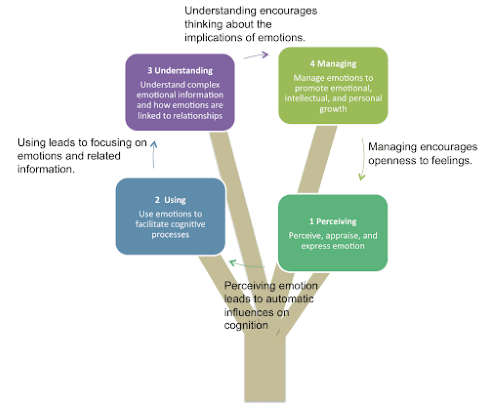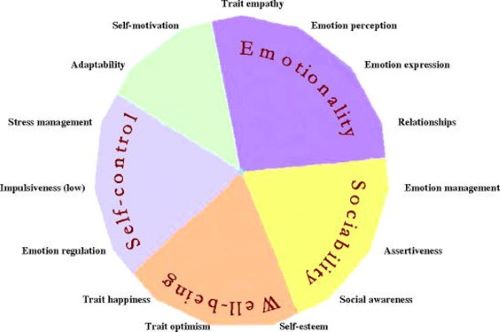Introduction
Emotional intelligence (EI) is widely recognised as an essential attribute for healthy leadership today. Research demonstrates EI’s predictive ability to improve well-being, promote prosocial behaviour, improve relationship quality, facilitate constructive communication, and have strong positive effects on job performance (Petrides & Mavroveli, 2018; Petrides et al., 2016). This article highlights some of the well-being benefits of EI for the pastoral profession and shares the results of a national survey that measured the EI of NZ Baptist pastors.
What is trait emotional intelligence?
EI can be understood as a set of distinct personality traits (e.g. empathy, assertiveness), concerned with emotion-related self-perceptions and dispositions, that determine the way people behave in emotional situations (Bar-On, 2006; Petrides & Furnham, 2003; Schutte et al., 2009). This conceptualisation of EI, known as trait EI, is measured via a self-assessment of an individual’s typical emotional behaviour (Siegling et al., 2015). Therefore, trait EI is concerned with “how good we believe we are in terms of understanding, regulating, and expressing emotions in order to adapt to our environment and maintain well-being” (Petrides et al. 2016, p.355). It is important to stress that trait EI does not measure a person’s actual ability against some standard, like an IQ test. Rather, it reflects a person’s self-perceived ability to understand, process, and use emotional information about his/her and other people’s emotions in everyday life. It reflects how individuals believe they typically respond emotionally when placed in similar situations.
Trait EI is typically contrasted with a conceptualisation of EI as a cognitive ability. Salovey and Mayer (1990) are credited with researching and developing the concept of EI as an ability. They argue that EI is a subset of social intelligence which involves an ability to understand and manage oneself and other people. They propose that those who utilise EI are more flexible planners, creative thinkers, and use emotion to redirect their attention to pressing needs and motivation to achieve tasks (Salovey & Mayer, 1990). As this theory was developed further it became known as the four-branch model of EI described as, “The ability to perceive accurately, appraise, and express emotion; the ability to access and/or generate feelings when they facilitate thought, the ability to understand emotion and emotional knowledge; the ability to reflectively regulate emotions in ways that promote emotional and intellectual growth” (Salovey & Mayer, 1997, p. 10). Measurement is via a performance-based test. Like an IQ test, it measures how well you solve emotional related problems as a standard form of intelligence. The test consists of doing such tasks as identifying emotions in pictures of faces, identifying emotions that would best facilitate a type of thinking (e.g., planning a birthday party), and describing responses to various scenarios to maintain or change one’s feelings.

That a distinction should be made between the two types of EI finds support in studies that have found that ability and trait EI measures are at best weakly related (Bastian et al., 2005; Brackett & Mayer, 2003; Davis & Humphrey, 2012; Goldenberg et al., 2006). Additionally, studies have shown that self-report EI measures moderately correlate with personality, while their correlations with cognitive abilities are near-zero. In contrast, ability EI models have low correlations with personality measures, and low-to-moderate correlations with cognitive abilities (Bastian et al., 2005). Understandably, the two forms of EI have quite different benefits, especially in terms of well-being.
Well-being benefits of trait EI
Studies demonstrate that trait EI has stronger health and well-being outcomes than ability EI (Goldenberg et al., 2006; Martins et al., 2010; Sánchez-Álvarez et al., 2016; Schutte et al., 2007). Self-reported trait EI is better at predicting emotional well-being, adaptive coping to stressful situations, social support seeking, and emotional expression (Goldenberg et al., 2006). Individuals with high trait EI can maintain a positive mood and self-esteem when faced with a negative situation (Schutte et al., 2002). High trait EI individuals are also more likely to appraise and to cope with situations in ways that are generally adaptive and helpful (Mikolajczak and Luminet, 2008). They carefully review a context before deciding how to use an emotion, and implement adaptive strategies in order to achieve positive long-term outcomes (Pena-Sarrionandia et al., 2015). Additionally, high trait EI individuals can regulate their emotions more effectively than low trait EI individuals.
Empirical research amongst the pastoral profession has established associations between low trait EI and psychological clinical disorders such as depression, anxiety and insomnia, (Vicente-Galindo et al., 2017), and burnout (Francis et al., 2019; Miller-Clarkson, 2013; Palser, 2005; Pegram, 2015). In contrast, Pasler’s (2005) study found no association between ability EI and pastoral burnout. Qualitative research highlights that some of the consequences of poor EI for pastors include depletion of energy for ministry, the inability of pastoral teams to manage relationships in healthy ways, and a drive to succeed from unhealthy motives such as seeking approval and significance (Bortner, 2018; Burns et al., 2013; Malphurs, 2018).
Measuring trait EI
Having established the well-being benefits of trait EI, we can now consider how to measure trait EI. An online search for EI tests results in literally hundreds of options to choose from. However, many of these tests have not been empirically validated. A helpful website in this regard is the Consortium for Research on Emotional Intelligence in Organisations (http://www.eiconsortium.org/index.html). Here you will find information on nearly a dozen different trait EI measures for which there is a substantial body of research.
Of these measures, the Trait Emotional Intelligence Questionnaire (TEIQue) is one of the most widely researched and validated measurements of trait EI. The TEIQue measures an individual’s typical emotional behaviour. This measure of trait EI consists of four broad factors: Well-being, Self-control, Emotionality and Sociability.

People who score highly on the well-being factor are generally optimistic, expecting positive things to happen in their life. They also have a positive view of themselves and their achievements (self-esteem) and are satisfied with their life in the present (happiness). The trait EI self-control factor measures an individual’s confidence in their ability to regulate his/her emotions, resist unhealthy impulsiveness, and capability to regulate external pressures and stress. Individuals with high scores in trait EI self-control are neither emotionally repressed nor overly expressive. In contrast, low scorers are prone to impulsive behaviour and may find it difficult to manage stress. Emotionality refers to being able to identify one’s own and other people’s emotions (emotion perception). They are also capable of accurately communicating their feelings to others (emotion expression). Additionally, they are able to see the world from someone else’s point of view (empathy) and can establish and maintain emotional bonds with close others such as family and friends. Finally, trait sociability reflects how confident a person is to influence other people’s emotions in social settings. They are also assertive, knowing how to ask for things, give and receive compliments, and confront others when necessary. High scorers believe they are good at negotiating and influencing others. The trait EI assessment also has a global score that provides a snapshot of your general overall perceived emotional functioning.
The trait EI of NZ Baptist pastors
In 2019 a national survey of Baptist pastors was undertaken that included the TEIQue Short Form (30 questions). The following table shows the Global trait EI mean score recorded by NZ Baptist pastors, alongside the scores of other pastors and some service-oriented professions.
| Sample and Organisation | Sample Size | Mean |
| North American Counsellors (2016) | 539 | 5.6 |
| United Pentecostal Church Intenational Pastors (2015) | 81 | 5.4 |
| NZ Baptist Pastors (2019) | 204 | 5.3 |
| North American Pastors & Elders (2018) | 44 | 5.3 |
| Service sector employees (2013) | 137 | 4.9 |
| Spanish School Counsellors (2016) | 203 | 4.7 |
| Female Nurses Northern Poland (2018) | 188 | 4.7 |
The global trait-EI mean of NZ Baptist pastors (5.3) is similar to two other studies involving pastors from North America (5.3 and 5.4). NZ Baptist pastors also had a higher mean of global trait-EI than studies involving other service-oriented professions, apart from one study of North American Counsellors. Another way to look at NZ Baptist pastors’ Global trait EI score is to compare it with population norms. In this regard, when compared with UK population norms, 82.4% of NZ Baptist pastors view their Global EI as “above average!”
The research also affirmed the well-being benefits of trait EI. NZ Baptist pastors who were higher in trait EI experienced less anxiety, depression, and emotional exhaustion. More positively, they experienced more enthusiasm for, and greater satisfaction in ministry.
However, while this paints an encouraging picture, this does not mean that there isn’t room for improvement! Developing EI is a lifelong learning process with a number of studies indicating that it is possible to improve trait EI in adulthood (see: Kotsou et al., 2019; Mikolajczak & Pena-Sarrionanda, 2015). In this regard you may like to consider the following helpful resources:
- Developing Emotionally Mature Leaders: How Emotional Intelligence Can Help Transform Your Ministry, Aubrey Malphurs, 2018 (available at Carey Library)
- Emotional Intelligence 2.0, Travis Bradberry and Jean Greaves, 2009
- Resilient Ministry, Burns et al. 2013 (has a chapter on EI – available at Carey Library)
Conclusion
Pastors who are aware of, and confident in, their ability to understand, process, and use emotional information experience significant well-being benefits. These include experiencing less symptoms of anxiety, depression, and burnout, and greater satisfaction in ministry. In order to sustain a long-term, satisfying ministry, pastors are encouraged to regularly assess their EI, and engage with resources to help improve their EI as part of their ongoing lifelong learning.*
Note: If you would like to assess your trait EI you can download the TEIQue-SF here. To find our your trait EI score go to the psychometric labs website, scroll to the bottom of the page, download the Excel file “30 Form” and enter your answers to the 30 questions into the template (all values must be between 1 and 7, with no missing values). Then upload the excel file to the scoring engine and select ‘calculate result.’ This will give you your mean Global trait EI score and 4 factor scores. Alternatively, you can pay for a full TEIQue report here. However, it is relatively expensive and as I have never used this service myself, provision of this link should not be considered an endorsement of this service.
0 Comments